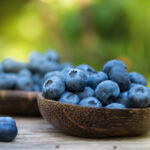Processors turn to mock berries to ease costs

Mock Crop's blueberries look and feel like the real thing, but take a second look before giving one a taste. These plastic molds have been developed for equipment testing - not for eating.
When the time comes for fruit packaging and processing companies to test machinery, it can become quite expensive or unfeasible to process actual fresh fruit. For a highly seasonal product, such as blueberries, distributors face the additional  challenge of tracking down reasonable volumes outside of the local season.
challenge of tracking down reasonable volumes outside of the local season.
At Michigan's Lakewood Process Machinery, for example, the lack of cost-efficient, readily available blueberries complicated the company's ability to maintain its cleaning and filling equipment.
While other companies may resort to dog food pellets as a cheap alternative, president Mike Miedema wanted to improve testing with a product similar to actual blueberries.
"Lakewood Process Machinery makes equipment for the blueberry industry, both on the fresh pack and processing side. So we get into cleaning and filling and all of that stuff. With blueberries being seasonal, having realistic product for testing has always been a challenge," he told www.freshfruitportal.com.
"Plus, if you get real blueberries, they tend to not run through a machine very well more than one time without becoming soft. So I had talked to LS Mold a while back about the idea of making a mold and getting some fake blueberries made that would be realistic in terms of size and shape."
From there, Miedema and LS Mold collaborated to form Mock Crop LLC, a manufacturer of a plastic fruit that imitates real blueberries in size, shape and color.
"We started with real berries and scanned them in using a 3D scanner. Then we sized them into four different sizes based on the actual shape of a blueberry. It was driven toward the sizing that our machinery would have to perform to. Then we got into coloring to make them as realistic as possible," he said.
Depending on buyer needs, Mock Crop can change the mold color or create fruit of various shades for testing in sorting machines.
With a vibrant blue color, the standard Mock Crop berry may trick the eye at first glance. The mold looks much like an actual blueberry, but not enough to mistake it as edible.
"I hope it's not that close that you would want to put it in your mouth but if it's sitting in a clamshell as they are sold in the grocery store, it would look realistic. So if a marketing group wanted to put it on display at a trade show, it would serve that purpose quite well," Miedema said.
Although the cost of artificial berries reflects that of actual berries, Miedema said the product has the advantage of durability.
"The cost of the fake ones is not a lot different than real ones as far as purchasing them because it is an expensive material.
"We focused heavily on getting the weights reasonably close to real blueberries. That's a big difference compared to other artificial berries that are of very light material. They look good but they not readily available in quantity and the weight is nothing like a real blueberry," he said.
"The material we ended up using is fairly expensive. The advantage is we can reuse these over and over again. So although the initial cost is about like buying real blueberries, you get to reuse them."
Blueberries are currently the only artificial fruit offered by Mock Crop but Miedema said the company is open to developing additional varieties.














































